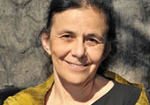Wafaa El-Sadr, M.D., M.P.H., has helped spearhead the development of several successful HIV care and treatment programs in resource-limited countries.
“Her intervention has saved millions of infant lives in resource poor countries by preventing HIV transmission to them from their mothers,” said Ayman El-Mohandes, M.B.B.Ch., M.D., M.P.H., dean of the College of Public Health.
 |
Wafaa El-Sadr, M.D., M.P.H. |
Her presentation starts at noon in the Eppley Science Hall Amphitheater. Below she gives UNMC Today a primer about her campus discussion.
What is the main message you want attendees to take away from your presentation?
That substantial progress has been made in the global response to HIV epidemic. These accomplishments and health system innovations can serve to respond to other major global health threats. The challenge is how to build on this platform effectively.
What are some of the potential opportunities you sense in terms of improving both HIV care and public health in general?
HIV is a chronic disease and responding to it has required a transformation to global health systems in most severely affected countries in a very fundamental way. This transformation is critical to addressing other challenges that require multi-dimensional responses and continuity care, for example tackling challenge of maternal mortality, neonatal mortality and chronic non-communicable diseases.
Also, what challenges do you see in both of these areas?
It is critical to bridge the divide between disciplines and interests. We must come together for lessons learned and joint planning.